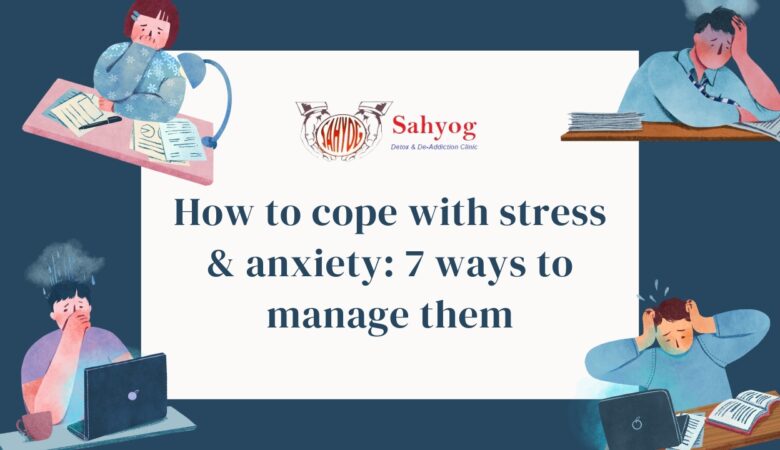How to cope with stress and anxiety: 7 ways to manage them
Stress and anxiety are a common part of modern life. The pressure to perform, meet deadlines, and manage relationships can leave us feeling overwhelmed and anxious. While it’s normal to experience some level of stress, chronic stress and anxiety can take a toll on our mental and physical health. Fortunately, there are many effective ways to cope with stress and anxiety. In this article, we will discuss seven proven strategies for managing stress and anxiety. 1. Exercise regularly Exercise is one of the most effective ways to reduce stress and anxiety. Regular exercise helps to reduce cortisol levels, a hormone that is associated with stress. Exercise also releases endorphins, which are natural mood-boosters that can help to alleviate anxiety and depression. In addition, exercise can help to improve sleep quality, which is essential for managing stress and anxiety. To get the most benefit from exercise, aim for at least 30 minutes of moderate-intensity activity most days of the week. This could include activities like walking, running, cycling, swimming, or yoga. Find an activity that you enjoy and make it a regular part of your routine. 2. Practice relaxation techniques Relaxation techniques, such as deep breathing, meditation, and progressive muscle relaxation, can help to reduce stress and anxiety. These techniques work by activating the body’s relaxation response, which helps to counteract the effects of the stress response. To practice deep breathing, find a quiet place where you can sit comfortably. Inhale deeply through your nose, allowing your belly to expand. Hold your breath for a few seconds, and then exhale slowly through your mouth, allowing your belly to deflate. Repeat this for several minutes, focusing on your breath and letting go of any thoughts or distractions. Progressive muscle relaxation involves tensing and then relaxing each muscle group in your body, one at a time. Start with your feet and work your way up to your head, tensing each muscle group for a few seconds before releasing the tension. 3. Get enough sleep Sleep is essential for managing stress and anxiety. When we don’t get enough sleep, our bodies produce more cortisol, which can increase feelings of stress and anxiety. In addition, lack of sleep can make it harder to concentrate and make decisions, which can add to feelings of stress. To get the best possible sleep, aim for 7-9 hours of sleep per night. Establish a regular sleep schedule, going to bed and waking up at the same time each day. Create a relaxing sleep environment, keeping your bedroom cool, dark, and quiet. Avoid screens for at least an hour before bed, as the blue light can interfere with sleep. 4. Eat a healthy diet Eating a healthy diet can help to reduce stress and anxiety. Foods that are high in sugar, caffeine, and processed ingredients can increase cortisol levels and worsen feelings of stress and anxiety. On the other hand, a diet rich in whole foods, including fruits, vegetables, lean proteins, and healthy fats, can help to stabilize mood and reduce stress. In addition, certain foods and supplements have been shown to have stress-reducing properties. For example, omega-3 fatty acids, found in fatty fish like salmon and tuna, can help to reduce inflammation and promote a sense of calm. Probiotics, found in fermented foods like yogurt and kefir, can also help to reduce stress and anxiety by supporting gut health. 5. Connect with others Social support is an important factor in managing stress and anxiety. Talking to friends, family members, or a therapist can help to reduce feelings of isolation and provide a sense of connection and understanding. In addition, socializing and participating in activities with others can help to distract from stressful thoughts and provide a sense of enjoyment and fulfillment. To connect with others, consider joining a social group or club based on your interests or hobbies. This can provide an opportunity to meet new people and engage in activities that bring you joy. You can also reach out to friends or family members for a chat, a meal, or a shared activity. If you’re struggling with stress and anxiety, consider seeking support from a mental health professional. A therapist can provide guidance and support in developing coping skills, managing symptoms, and improving overall well-being. 6. Manage your time effectively Effective time management can help to reduce feelings of stress and anxiety by creating a sense of control and reducing the likelihood of feeling overwhelmed. Start by prioritizing tasks and breaking them down into manageable steps. Use a planner or to-do list to keep track of deadlines and appointments, and give yourself plenty of time to complete tasks. It’s also important to take breaks and prioritize self-care. Set aside time each day to do something that brings you joy or relaxation, such as reading a book, taking a bath, or going for a walk. This can help to reduce stress and improve overall well-being. 7. Practice self-compassion Finally, it’s important to practice self-compassion when managing stress and anxiety. Recognize that stress and anxiety are normal parts of life, and that it’s okay to ask for help when you need it. Be kind and gentle with yourself, and avoid self-criticism or negative self-talk. When you’re feeling stressed or anxious, take a moment to check in with yourself and ask what you need in that moment. Maybe it’s a break, a hug, or a kind word from a friend. Whatever it is, allow yourself to receive it with kindness and gratitude. Teens and Stress Teenagers face a lot of stress in their lives. Between school, extracurricular activities, social pressures, family expectations, and hormonal changes, it’s no wonder that many teens struggle with stress and anxiety. In fact, according to a survey by the American Psychological Association, teenagers are among the most stressed-out groups in the United States. Here are some common sources of stress for teenagers: 1. School School is one of the biggest sources of stress for teenagers. They are expected to balance academic workloads, extracurricular activities, and


